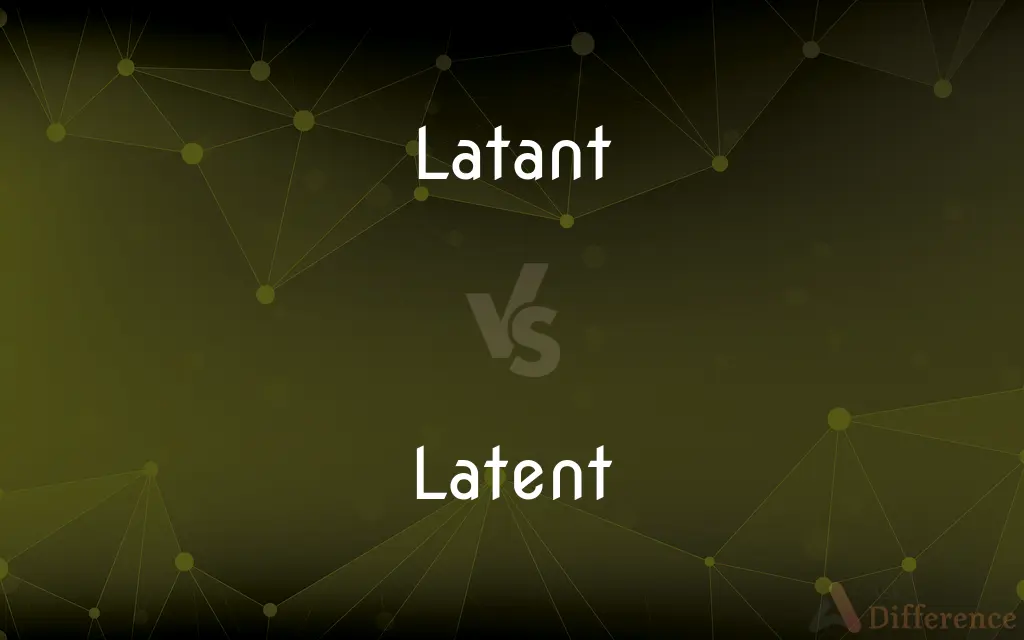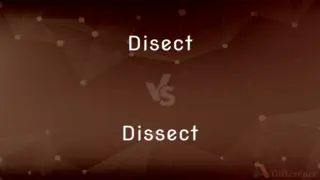Latant vs. Latent — Which is Correct Spelling?
By Tayyaba Rehman — Updated on March 28, 2024
"Latant" is an incorrect spelling. The correct spelling is "Latent," which means existing but not yet developed or manifest.

Table of Contents
Which is correct: Latant or Latent
How to spell Latent?

Latant
Incorrect Spelling

Latent
Correct Spelling
ADVERTISEMENT
Key Differences
"Latent" contains "tent," like a hidden shelter.
Recall that "latent" has one 't' in the middle, not two.
Remember the association with "late"; something latent may manifest "late."
"Latent" rhymes with "patent," another word for something that’s revealed.
Associate it with "latent fingerprints" which are hidden until revealed.
ADVERTISEMENT
How Do You Spell Latent Correctly?
Incorrect: She thought the solution was latant in the text.
Correct: She thought the solution was latent in the text.
Incorrect: He has a latant ability in art that he hasn't explored yet.
Correct: He has a latent ability in art that he hasn't explored yet.
Incorrect: The latant anger in the community eventually surfaced.
Correct: The latent anger in the community eventually surfaced.
Incorrect: The disease remained latant for several years.
Correct: The disease remained latent for several years.
Latent Definitions
Latent also means lying hidden and undeveloped until conditions are right.
The seeds lay latent in the soil.
It signifies a dormant or hidden potential.
There's a latent defect in the product.
Latent means present but not visible or apparent.
She discovered her latent talent for singing.
Latent describes conditions that are not active or developed.
Latent tuberculosis is not contagious.
It pertains to something concealed from usual observation.
The latent details became clear under scrutiny.
Present or potential but not evident or active
Latent talent.
(Medicine) Present but not symptomatic
A latent virus.
(Biology) Being in a condition of biological rest or inactivity characterized by cessation of growth or development and the suspension of many metabolic processes
A latent bud.
(Psychology) Present and accessible in the unconscious mind but not consciously expressed.
A fingerprint that is not apparent to the eye but can be made sufficiently visible, as by dusting or fuming, for use in identification.
Existing or present but concealed or inactive.
Remaining in an inactive or hidden phase; dormant.
(biology) Lying dormant or hidden until circumstances are suitable for development or manifestation.
(forensics) The residue left by a person's finger that can be made visible by a process such as powder dusting; a latent fingerprint.
(statistics) An underlying cause that can be inferred from statistical correlations; factor.
Anything that is latent.
Not visible or apparent; hidden; concealed; secret; dormant; as, latent springs of action.
The evils latent in the most promising contrivances are provided for as they arise.
Existing but not presenting symptoms; dormant or developing; - of disease, especially infectious diseases; as, the latent phase of an infection.
Potentially existing but not presently evident or realized;
A latent fingerprint
Latent talent
Not presently active;
Latent infection
Latent diabetes
Latent Meaning in a Sentence
Some children have a latent ability for languages that is not apparent until they are exposed to a multilingual environment.
The seeds of great discoveries are often latent in the minds of the curious.
Many viruses remain latent in the body for years before becoming active.
Her latent skills in painting became apparent after she took her first art class.
The latent heat of the substance was critical to the experiment's success.
The latent conflict between the two groups eventually led to open disagreement.
The scientist discovered latent patterns in the data that could predict weather changes.
Despite her quiet demeanor, she had a latent strength that surprised many.
The detective believed that the clue to solving the case was latent in the evidence room.
With proper training, you can unlock the latent potential within you.
His latent talent for music was discovered when he effortlessly played the piano at a party.
Her latent desire to travel the world emerged after reading a book about adventures.
The technology had latent capabilities that were not initially apparent to the developers.
Latent defects in the construction were not discovered until years later.
The latent power of the mind can be tapped into with meditation and focused thought.
Latent memories of his childhood surfaced during the therapy sessions.
Some students have latent academic abilities that are not visible because they are not challenged enough.
She had a latent knack for solving complex puzzles that she never knew existed.
The garden was designed to bloom in phases, revealing its latent beauty over time.
The latent possibilities of the new software excited the team.
Common Curiosities
What is the verb form of Latent?
The related verb is "lie latent," but "latent" itself is not a verb.
What is the pronunciation of Latent?
It is pronounced as /ˈleɪ.tənt/.
Why is it called Latent?
Latent is derived from the Latin word "latens," meaning "lying hidden" or "concealed."
Which vowel is used before Latent?
There isn't a specific vowel that always precedes "latent"; it depends on the context.
Which preposition is used with Latent?
Commonly, "in" as in "latent in the system."
What is the plural form of Latent?
Adjectives like "latent" don't have plural forms.
Is Latent an adverb?
No, latent is not an adverb.
Is Latent an abstract noun?
No, latent is an adjective.
What is the root word of Latent?
The root word is the Latin "latens."
Which conjunction is used with Latent?
There is no specific conjunction that is exclusively used with "latent"; it depends on the context.
Which article is used with Latent?
Both "a" and "the" can be used with "latent" depending on the context, e.g., "a latent talent" or "the latent symptoms."
Is Latent a noun or adjective?
Latent is an adjective.
Is Latent a countable noun?
Latent is not a noun; it's an adjective.
What is the singular form of Latent?
Latent is an adjective and does not have a singular or plural form like nouns do.
Is the Latent term a metaphor?
Not in itself, but it can be used metaphorically, e.g., "latent potential."
Which determiner is used with Latent?
It depends on the context, but common determiners can include "a," "the," "this," and "that."
Is Latent a negative or positive word?
Latent is neutral; it describes something present but not visible or apparent.
Is Latent a vowel or consonant?
"Latent" is a word, not a single letter. It contains both vowels and consonants.
Is the word Latent a gerund?
No, latent is an adjective and does not have a gerund form.
How do we divide Latent into syllables?
La-tent.
What is another term for Latent?
Another term is "dormant."
Is the word Latent imperative?
No, latent is an adjective and does not have an imperative form.
What is a stressed syllable in Latent?
The first syllable, "La," is stressed.
What part of speech is Latent?
Latent is an adjective.
What is the third form of Latent?
Adjectives don't have verb forms, so there's no third form for "latent."
How is Latent used in a sentence?
Example: "Though she seemed calm, there was a latent anxiety in her eyes."
How many syllables are in Latent?
There are two syllables in "latent."
What is the opposite of Latent?
One opposite could be "manifest."
What is the second form of Latent?
Adjectives don't have verb forms, so there's no second form for "latent."
Is Latent a collective noun?
No, latent is an adjective.
Is the word “Latent” a Direct object or an Indirect object?
As an adjective, "latent" does not function as a direct or indirect object. However, a noun it modifies can.
What is the first form of Latent?
Latent is an adjective, so it doesn't have verb forms.
Share Your Discovery

Previous Comparison
Disect vs. Dissect
Next Comparison
Addamant vs. AdamantAuthor Spotlight
Written by
Tayyaba RehmanTayyaba Rehman is a distinguished writer, currently serving as a primary contributor to askdifference.com. As a researcher in semantics and etymology, Tayyaba's passion for the complexity of languages and their distinctions has found a perfect home on the platform. Tayyaba delves into the intricacies of language, distinguishing between commonly confused words and phrases, thereby providing clarity for readers worldwide.













































